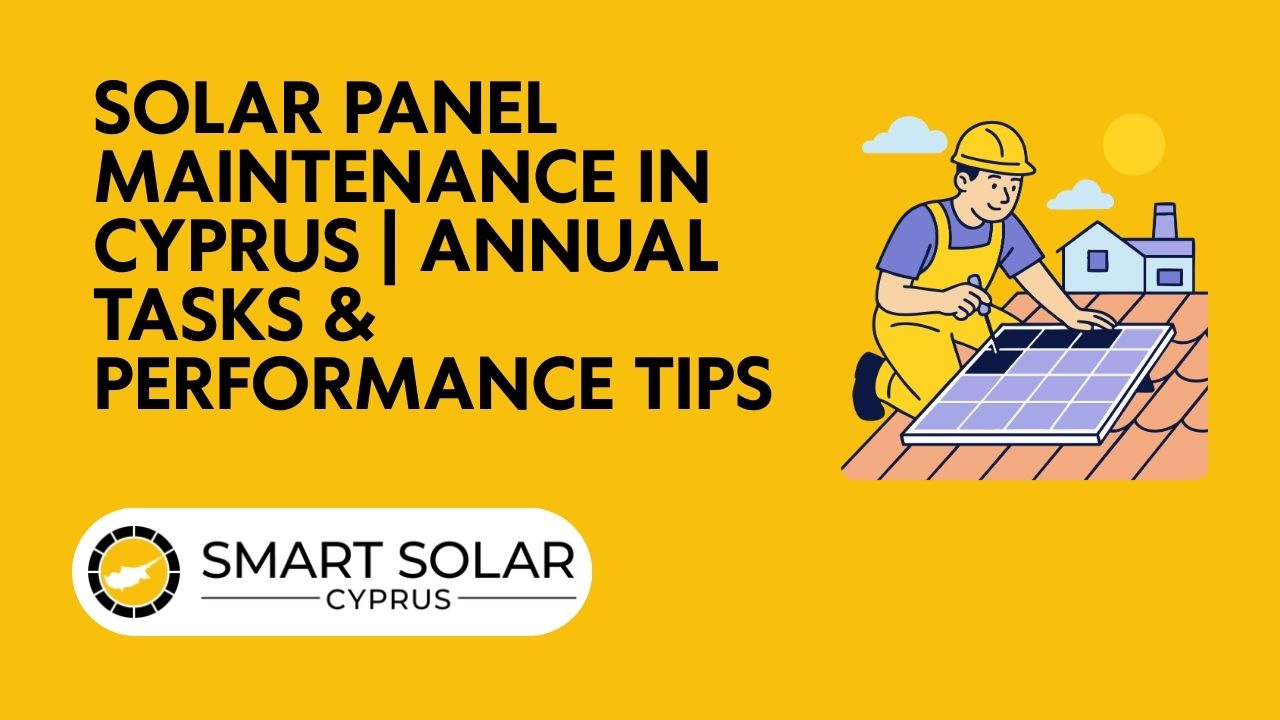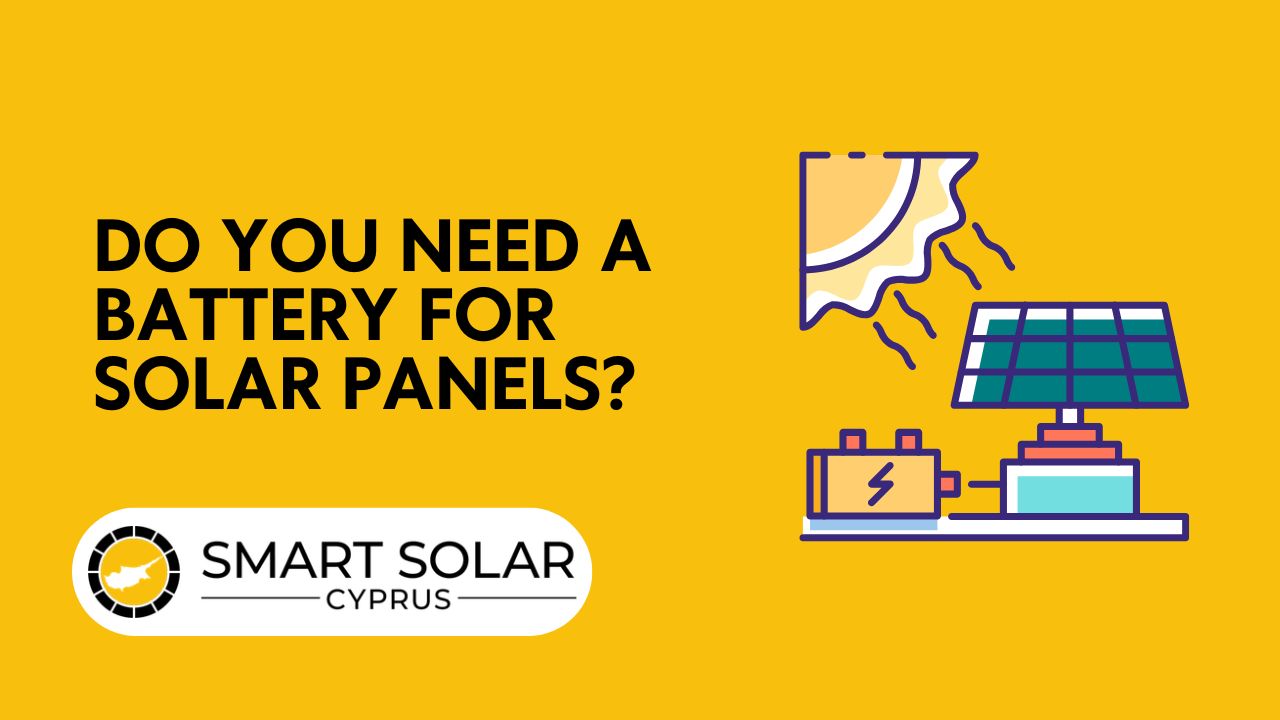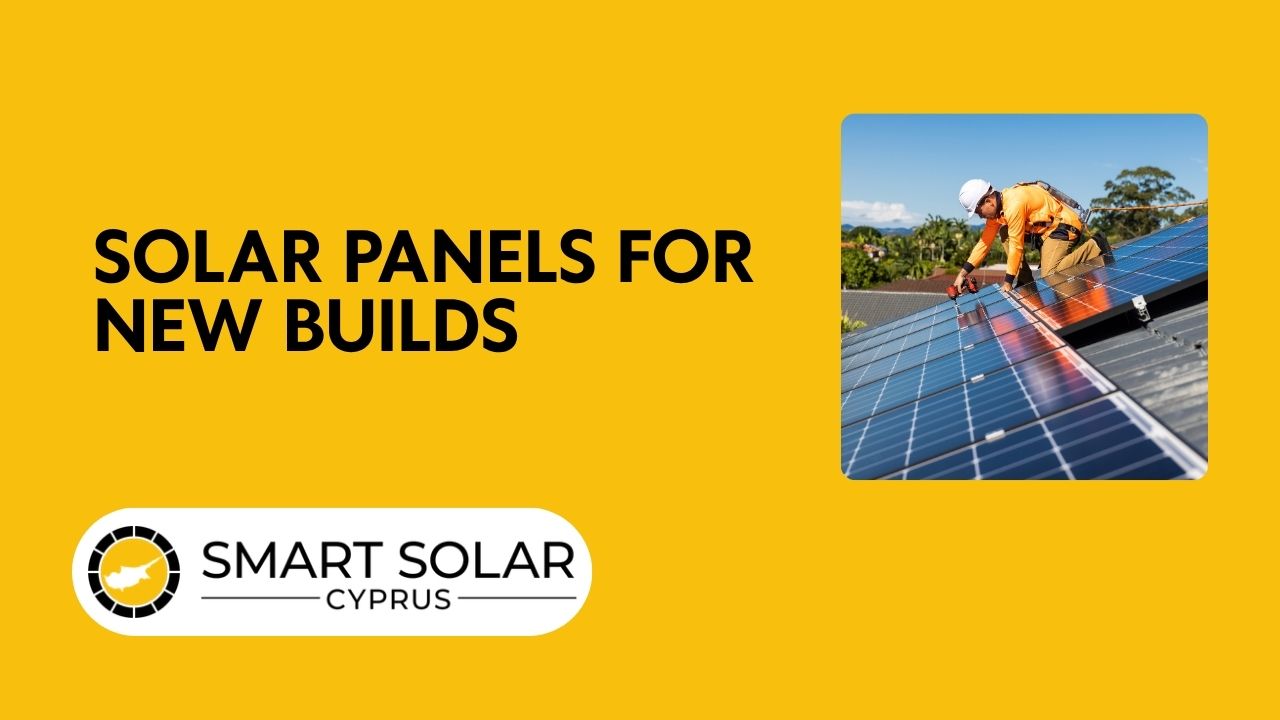Solar panels are designed to operate for decades with minimal intervention, but the Cyprus climate introduces specific challenges that homeowners must account for. High temperatures, dust, coastal humidity, and seasonal pollen can reduce system performance if panels are not maintained correctly. This guide explains exactly what maintenance a solar PV system in Cyprus requires, what issues are most common, how to maximise long-term efficiency, and when to seek professional support.
How Often Do Solar Panels Need Maintenance in Cyprus?
Most homeowners in Cyprus only need to perform basic maintenance 1–2 times per year. The majority of PV systems operate autonomously, with modern inverters continuously monitoring performance. However, because Cyprus has a hot, dry climate for more than half the year, combined with wind-borne dust from Sahara storms, light debris accumulation is common.
The goal of maintenance is simple: keep panels clean, ensure cables and mounts remain secure, and verify that the system is producing the expected output based on the season.
Annual Maintenance Checklist
Below is a practical maintenance routine that ensures a Cyprus PV system remains efficient year-round.
1. Visual Inspection of Panels and Roof Area
Once or twice per year, inspect the roof area to ensure nothing is obstructing the panels. Look for:
- Dust or sand build-up
- Bird droppings
- Leaves or branches
- Moss on concrete tiles
- Shading introduced by new structures or growing trees
Even a small amount of shading can reduce the performance of the entire string of panels. Early detection prevents ongoing losses.
2. Cleaning the Panels
How often should panels be cleaned?
In Cyprus, panels should be cleaned once or twice per year, depending on location.
- Coastal homes may need more frequent cleaning due to sea salt residue.
- Rural or agricultural areas may require cleaning after dust storms or harvesting seasons.
- Paphos and Larnaca areas are more affected by spring pollen.
How to clean them safely
- Use a soft sponge or brush with deionised or clean tap water.
- Avoid high-pressure washers, which may damage seals.
- Clean early in the morning or at sunset when panels are cool.
Never step directly on panels, and ensure proper safety equipment when accessing roofs.
3. Inspecting Mounting Frames and Fasteners
Cyprus experiences strong coastal winds, especially during winter storms. Mounting frames should be checked annually for:
- Loose bolts
- Corrosion (especially in coastal zones)
- Movement or vibration
- Cracks around mounting points on tiled roofs
Well-installed systems rarely have issues, but early tightening of bolts or replacing corroded components prevents long-term structural damage.
4. Monitoring Inverter Performance
The inverter is the technical heart of a PV system and should be checked more regularly than the panels themselves.
Key checks:
- No unexpected error codes
- Output values match typical seasonal production
- The unit has adequate ventilation
- No buzzing or irregular noise
- No visible moisture or condensation
Most inverter failure warning signs appear gradually. If output drops unexpectedly, the inverter is the first place to investigate.
When to update firmware
Hybrid and smart inverters often release firmware updates to improve performance, especially for battery management. These should be applied by a qualified technician.
5. Verifying Electrical Connections
DC and AC connections should be inspected every two to three years by a licensed technician. Cyprus heat cycles can cause expansion and contraction, which may loosen connections over time.
Inspections include:
- DC connectors and junction boxes
- AC breakers and isolators
- Cable insulation condition
- Earthing verification
An electrical inspection reduces fire risks and ensures the system is operating safely and efficiently.
Common Issues with Solar Panels in Cyprus
Even though PV systems are reliable, certain issues are more common due to Cyprus’ climate and typical installation patterns.
1. Dust and Sand Accumulation
Sahara dust events can reduce output by 10–30 percent until panels are cleaned. Rain occasionally helps wash panels, but often leaves muddy residue. Regular inspections after these events are recommended.
2. High Temperature Efficiency Loss
During summer, panel surfaces can exceed 60°C. All solar panels experience light efficiency loss at high temperatures, but modern monocrystalline modules are designed to handle Cyprus conditions.
Shaded ventilation, high-quality mounts, and panels with low temperature coefficients help reduce the impact.
3. Salt Corrosion Near the Coast
Homes within 500 metres of the sea may experience salt exposure. This can accelerate corrosion on:
- Mounting frames
- Screws and fasteners
- Metal junction boxes
Choosing anodised aluminium, stainless steel hardware, and Tier-1 panels with anti-corrosive backing minimises risk.
4. Inverter Overheating
Inverters placed in direct sunlight or poorly ventilated areas may overheat, causing:
- Reduced performance
- Shortened lifespan
- More frequent tripping
Best practice is to install the inverter in a shaded, cool location such as a utility room or garage.
5. Bird Nesting Under Panels
Pigeons and doves may nest under roof-mounted solar panels, especially near urban areas. This can cause:
- Wiring damage
- Shading issues
- Fire risk due to debris build-up
Bird mesh or perimeter guards prevent nesting without harming the birds.
How to Know if Your Solar Panels Need Maintenance
A well-monitored system provides clues when something is not right. Homeowners should investigate if they notice:
- A gradual or sudden drop in daily or monthly output
- Inverter error messages
- Increased electricity bills despite stable usage
- New noises from the inverter
- Visible roof debris or shading
Comparing output to previous months or to a neighbour’s similar system can also help detect problems early.
Should You Hire a Professional for Maintenance?
While basic cleaning can be done by homeowners, professional inspections provide deeper safety and performance checks.
A professional service typically includes:
- Electrical testing of strings
- Thermal imaging to detect hotspots
- Detailed inverter diagnostics
- Verification of earthing and surge protection
- Structural inspection of mounting system
- Panel and connector integrity check
For most homes, scheduling a professional inspection every two to three years is sufficient.
Expected Lifespan of a Solar System in Cyprus
With proper maintenance, a high-quality PV system in Cyprus can last:
- Panels: 25–30 years
- Inverter: 10–15 years (shorter for older string inverters)
- Hybrid inverter: 7–12 years depending on battery cycles
- Mounts and cables: 20+ years
Coastal areas may experience slightly shorter component lifespans unless anti-corrosive materials are used.
Tips to Maximise Long-Term Performance
- Choose Tier-1 panels with strong salt and heat resistance.
- Select anodised aluminium mounting structures.
- Install the inverter in a cool, dry, shaded location.
- Keep trees trimmed to avoid new shading as they grow.
- Use a hybrid inverter to allow future battery upgrades.
- Monitor the system regularly or use an app for alerts.
Small routine checks can preserve annual output and extend system life significantly.
TLDR
Solar panel maintenance in Cyprus is straightforward and requires only a few annual tasks to maintain peak efficiency. By keeping panels clean, monitoring the inverter, checking mounts, and addressing environmental challenges such as dust, heat, and coastal exposure, homeowners can ensure their systems deliver maximum electricity savings for decades. With high-quality installation and periodic professional inspection, a Cyprus PV system remains one of the most reliable and cost-effective energy investments available.

How Much Money Can You Save With Solar?










